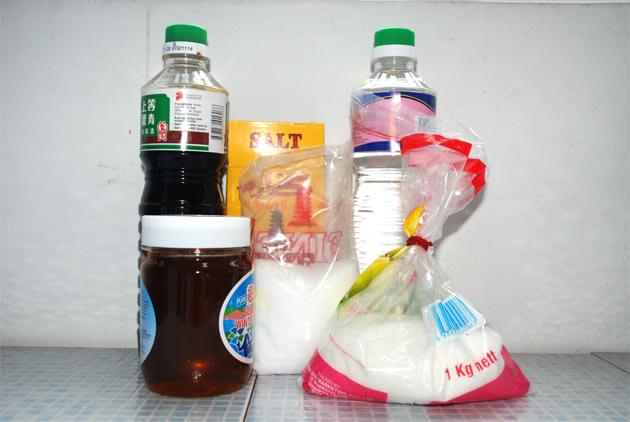
Soy sauce & Salt
Soy sauce contains salt, which is a natural food preservative. It slows down food spoilage by preventing microbial growth. Prof Yuk explains that salt binds to water molecules and ‘removes’ the available (free, unbound water molecules) water required for microbial growth. Prof Liu explains that most microorganisms are not able to tolerate and survive in the high salt environment as they tend to lose water and get dehydrated.
Salt can last forever as it does not degrade or become stale when in its dry crystalline form, as stated on the official website of a salt producer in the United States. However, the ‘useable life can be limited by caking or lumping of salt crystals due to moisture.’
Sugar
As with salt, sugar has a similar effect in inhibiting microbial growth through dehydration. When kept well and in a moisture free environment, sugar can last forever. That is, in our lifetime.
Honey
It is commonly known that honey does not expire. As with sugar and salt, the high sugar content in honey results in a low water activity. Such an environment is not suitable for microbial growth, explains Prof Yuk. However, he says if it is left exposed to the air, mold will be able to grow on the surface.
Rice
Uncooked rice is dry with low moisture. Prof Yuk explains that such a condition does not allow for bacterial growth. If such dry conditions are maintained, we can keep them for as long as we want.
Hard liquor
Hard liquor such as rum Chinese bai jiu (white spirit), vodka, rum and whiskey are high in alcohol (ethanol) content can last for a very long time if properly kept without exposure to the air. Prof Yuk explains that if wine is exposed to air, it will be oxidized by the oxygen in the air to produce vinegar (acetic acid) which will then lead to a change in flavour. He adds that alcohol is anti-microbial. Thus, their growth is prevented in such drinks.
Vinegar
Acetic acid is the main constituent of vinegar. Research studies conducted by the Vinegar institute, an association of vinegar manufacturers confirms that vinegar’s shelf life is almost indefinite. They explain that its acidic nature makes it self-preserving, without the need for refrigeration. White distilled vinegar, for instance, will remain virtually unchanged over a long period of time. Prof Yuk explains that the acidic environment (low pH) prevents most microbial growth. While there may be some observable changes in colour or sediment appearance, the vinegar is still edible.
Baking soda
The alkaline nature of baking soda (or sodium bicarbonate) inhibits microbial growth. If kept away from moisture, the dry powder form can remain unchanged. Prof Liu adds that nothing will be able to grow on it, not even mold.
No comments:
Post a Comment